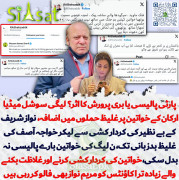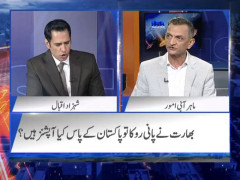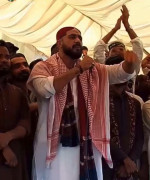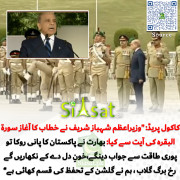Rancher
Senator (1k+ posts)
Moment someone utters the word Rafi, first thing comes to our mind is the Legendary Singer Mohammed Rafi. The most versatile singer of Bollywood. Today, I was just surfing over the net and suddenly while looking at news items, I realized that today (as per PST) that is December 24[SUP]th[/SUP] is the Birthday Anniversary of one of the Greatest Singers Mohammed Rafi. So I decided to pay him a tribute though this article. Rafi was born on December 24[SUP]th[/SUP], 1924 in Kotla Sultansingh village in Punjab, near Lahore.
When Rafi was only 15 years old, he decided to become a singer against the wishes of his parents. His elder brother of course supported Rafi, as he had recognized that his brother definitely will make it very big in singing world some day. So he supported Rafis idea to become a singer. His brother did not want Rafi to waste his God-given talent. In 1941, when Rafi was only 17 years old, he got an opportunity to sing under the music direction of late Shyam Sunder for the Punjabi Film Gul Baloch. At this time, Rafi did not have formal training in Classical Music. However, music director noticed that Rafi Sahab had a remarkable memory. Shyam Sunder recorded Rafis song in one take. Shyam Sunder was surprised at Rafis singing ability. He suggested Rafi to migrate to Mumbai and then after landing in Mumbai, Rafi recorded second song for the film Gaon Ki Gauri in 1942 under the music direction of Shyam Sunder. Later, Rafi Sahab received training from prominent classical Ustads like Abdul Wahid Khan, Pandit Jiwanlal Matto, Ghulam Ali Khan and Firoz Nizami - all doyens and devotees of music.
After Rafis successful debut in Mumbai, Rafi decided to make it even bigger. He approached Great music director of the time Naushad. At that time, legendary singer K.L.Saigal was number one singer. And Rafi requested Naushad if he could give him a chance as a chorus singer to support the main singer K.L. Saigal for the film Shajahan. This was Rafis initial ambition. Naushad did not disappoint Rafi. He gave Rafi a chance to sing 2 lines with K.L.Saigal. Those 2 lines were Ruhi Ruhi Mere Sapnon Ki Rani. Rafi then had couple of hit songs as a solo singer in few more movies. Rafi soon realized that he had a tough competition from Great singers of the time Manna Dey, Mukesh, Hemant Kumar and Talat Memood. Rafi decided to take the challenge.
Rafis first big break came with the film Baiju Bawara. For this film, Naushad had already composed the tunes for 2 Great classical songs for Rafi Man Tadapt(Raga Malkauns) and O Duniya Ke Rakhwaale (Raga:Darbari Kanada). Since Rafi was novice at that time, Naushad was not so sure if Rafi will give justice to these songs because of his Urdu diction. For these 2 songs Naushad preferred Sanskrit diction.
Initially, the Urdu-speaking Mohammed Rafi had problems pronouncing some Sanskrit words of Man Tadapatbhajan. So the music director, Naushad had to invite Sanskrit pundits from Varanasi to train Mohammed Rafi so that he could pronounce the Sanskrit lyrics of the bhajan correctly. The pundits had to work very hard to improve Mohammed Rafi's diction. But after a great deal of effort, the pundits finally did succeed in improving Rafi's pronunciation to the desired extent. After several rehearsals, Naushad gave them his final approval to record this bhajan. This bhajan is popular even today. This bhajan has been sung at least once in most of the temples all over the world. We have heard this bhajan thousands of times, and we still want to listen to it over and over again. This does not surprise me when I consider all the effort that went into the composition and rehearsals of this Great bhajan before it was recorded. I do not think there is any another composition in Hindi films based on Raga Malkauns that is better than Man Tadpat. This is just my view.
Baiju Bawaras classical based songs became superhit. And Rafi climbed up to the top of the music charts to become Number One singer of the film industry surpassing all other singers of the time. According to music experts, no other film (with classical music) has surpassed Baiju Bawaras classical music. Soon Rafi became darling of all other music directors such as Shankar-Jaikishen, S.D.Burman, O.P.Nayyar, Madan Mohan, Chitragupta, Usha Khanna, Iqbal Quraishi, Salil Choudhary, Kalyanji-Anandji, N.Datta, Madan Mohan, Laxmikant-Pyarelal, Usha Khanna and R.D.Burman. Rafi never looked back until 1969 when Kishore Kumar shot to fame with S.D.Burman song Mere Sapnonki Raani Kab Ayegi Tu from the film Aradhana. One should note here that all Great Maestro Music directors of 1950s and 1960s preferred Rafi for all type of songs, since Rafi had a tremendous voice range encompassing all 3 octaves and even higher (proof is in the film Baiju Bawara Song O Duniya Ke Rakhwaale). If all these Great music directors of 1950s and 1960s (the Golden Era of Hindi Film Music) had the same opinion then we can safely conclude that Rafis voice was something special which no other singer ever possessed.
In 1948, after the tragic death of our Father of the Nation Mahatma Gandhi, Rafi sang one emotional song Bapu Ki Ye Amar Kahani composed by Maestro Music Directors duo Husnalal-Bhagatram (Shankar-Jaikishens of 1940s). This emotional song became very popular all over India and moved to ears the then Prime Minister of India late Jawaharlal Nehru. During his lifetime Rafi Sahab sang more than 26,000 songs. Rafi was a master of all types of songs. There came a time in 1960s when Rafi gave playback to all the heroes of Hindi films such as Dev Anand, Shammi Kapoor, Dilip Kumar, Raj Kumar, Rajendra Kumar, Dharmendra, Manoj Kumar, Biswajeet, Joy Mukherji and many others. Rafi was instrumental in forming the rebellious image of Shammi Kapoor with his Yahoo type songs. Rafi was also responsible through his songs to shape Rajendra Kumar as a jubilee star.
Rafi also gave playback to Kishore Kumar for the films Raagini (Song : Man Mora Bawara) and Shararat (Song : Ajab Hai Dastan Teri Ai Zindagi).
In conclusion, Rafi is the only singer who could sing with ease all types of songs involving classical numbers, romantic songs, sad songs, bhajans, ghazals, qawwalis. And his voice could match all the heroes of 1950s and 1960,s and also 1970s. No other singer could match this versatility of singing of all types of songs. Some singers excelled in classical, some in sad and romantic numbers, some in ghazals and some in bhajans and some only for particular type of heroes etc. So fact that Rafi could sing all types of songs speaks for his Great versatility. Scores of articles have been written on Rafi. One does not have to read so many articles on Rafi to realize his Greatness. When one listens to Rafis variety of songs, they will speak volumes about his Great singing ability.
In 1965, Indian Government awarded Rafi the prestigious National award Padmashri. In 1977, Rafi was awarded Rajat Kamal award by the then President Shri Sanjiva Reddy at the 25[SUP]th[/SUP] National Film Festival Awards ceremony held in Delhi. In spite of being number one singer, Rafi was a very humble, soft-spoken and unostentatious person.
Rafi had a tremendous integrity and at times helped struggling music directors while singing for them without charging them any fees. Toady there is no substitute for Rafi. Rafis voice truly reflected his own character. The purity of his voice reflected his own noble character. The purity of his voice reflected his own ideals and mind. Rafi was very unassuming. His greatness lies with the fact that he never had any ego. Rafi was never affected by material values. Material values never affected Rafis social ethics. Rafis voice reflected spirituality.
Rafi maintained unblemished illustrious career and scaled heights of fame and popularity no other sing ever achieved. Rafi retained untarnished and unblemished image in the Bollywoods film industry otherwise known for vices than good it produces. Rafi had absolutely no vices whatsoever. Ione of the interviews, Rafi revealed that he held all the Religions in high esteem.
Rafi was a very charitable person. He donated part of his money to different charities. He had very good public relations with all the music directors, movie directors and producers. Rafi was very popular as a good human being among all the people working in Bollywood. Rafi was also a very pious person. Rafi never cared about getting royalty for the songs he sung. He only charged money upfront for each song and that was it.
In early 1960s, Rafi had a difference of opinion with Lata Mangeshkar who insisted upon getting the royalty in addition to the payment for each song. Rafi did not agree with Lata and because of these differences Rafi and Lata did not sing together for few years during 1960s.






























